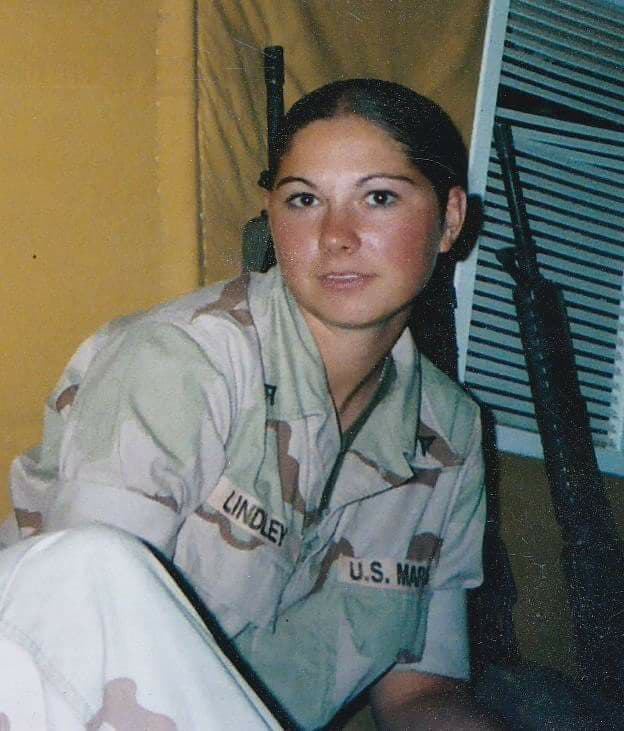This is what it's like to be a female vet with PTSD who's hit rock bottom
"Rock bottom did have a basement."


A free daily email with the biggest news stories of the day – and the best features from TheWeek.com
You are now subscribed
Your newsletter sign-up was successful
Annie Taschler, a 34-year-old veteran who served in the Marine Corps, says the best part about her new, albeit tiny, apartment is that she can lock her door at night.
Up until recently, "home" was an emergency women's shelter in Washington state, where she stayed for about a month.
Taschler, who deployed twice during her four years of service, says the area near the shelter was plagued with heavy drug use and violence. "It [was] almost like being back in Iraq," the single mother says, "because you [had] to watch your back constantly and be aware of your surroundings."
The Week
Escape your echo chamber. Get the facts behind the news, plus analysis from multiple perspectives.

Sign up for The Week's Free Newsletters
From our morning news briefing to a weekly Good News Newsletter, get the best of The Week delivered directly to your inbox.
From our morning news briefing to a weekly Good News Newsletter, get the best of The Week delivered directly to your inbox.
Taschler is just one of countless women who've served their country proudly, only later to find themselves struggling to deal with the repercussions of trauma. According to a February report from the National Center for Veterans Analysis and Statistics, female veterans are two to four times more likely to become homeless compared to their civilian counterparts.
To make things worse, Taschler suffers from post-traumatic stress disorder. A lot of it, she says, stems from the fact that she discovered she was pregnant with her daughter two months into her second tour in Iraq, and she was afraid she was going to lose her baby. "[Doctors] told me there was going to be problems with the pregnancy, with my child, due to the anthrax shots, the malaria pills, and all the things we had to be exposed to out in the country," she says.
That, coupled with a very scary backdrop of "rockets, mortars, and big booms," made the whole experience overwhelming. "I was scared, I was pregnant, I wasn't even 21 years old at the time," Tashler says. "It was just too much hitting at once."
The stress of that experience, however, didn't catch up to her for a few years. It actually wasn't until she divorced her daughter's father and moved from North Carolina to Washington in 2009 that she found herself feeling reclusive and paranoid. "It was just me and my 4-year-old. I had never lived on my own before," she recalls, adding that she joined the military at 18. "It was hard to transition from military life to civilian life. I started showing really bad signs of paranoia and [was] just closed off from everybody. My daughter was actually the one that brought it to my attention — that I kept doing things like checking the window constantly, or I wouldn't open the door or answer the phone for anyone."
A free daily email with the biggest news stories of the day – and the best features from TheWeek.com

On the outside, Taschler says she appeared to have it mostly together. She utilized her GI bill and went to school so she could work as a graphic designer, all the while taking care of her daughter as a single parent. "I put on my game face," she says, "but inside I was just dead." To cope, Taschler says, she began drinking alcohol in secret.
The bottom started to fall out in 2014. Two weeks before Christmas, Taschler was evicted from the home she was renting. She'd gotten behind on payments because of stomach issues associated with a bacterial infection that put her in the hospital and prevented her from working. Still, she pressed on: She and her daughter stayed with family and friends, and last year, she finally found what she thought was a good fit in terms of employment when she joined a mobile and web app development company.
This September, all that changed. She was living with her boyfriend at the time, and a fight, fueled partially by alcohol, left her homeless. Feeling sick from her stomach issues, she decided it was in her daughter's best interest to send her to stay with her ex-husband's mother in another state for a while. The next day, when she went to work with her discharge papers from the emergency room, she was fired. "He just said, it's not working … and then I was escorted out of the building, like I was some vicious animal or something."
A coworker who was also a veteran suggested Taschler might find the help she needed if she checked herself into the nearby VA hospital, which she did that same day. "I admitted myself because I realized I had literally lost everything," she says. "Rock bottom did have a basement."
"When I went in," she continues, "I clocked in at 99 pounds. I usually run at about 130. I had stressed myself out so bad I had lost all that weight." During her two-week stay in the psych ward, Taschler says the most memorable part was having someone listen to her. "The stay there, it benefited me leaps and bounds, and I walked out of there a different person."
At the time of our interview, Taschler was a little more than a month sober. She says she wants to be a peer counselor to help other veterans — something she thinks would be particularly beneficial for other female vets, especially since she didn't encounter any female peer counselors during her own stay.
Now that she's had time to reflect, Taschler says part of the reason it took her so long to seek help was because of the stigma surrounding mental health issues; she also acknowledges that women in the military already have to overcome the stereotype that they're weak. "When you hear 'Marine,' you instantly think, 'You're a badass. You've got this handled.' And it's hard because you're supposed to be the helper. You're the one that's supposed to be making sure everybody's safe and taken care of. We see things that we pray no civilian has to see."
"We take that hard exterior, and we try to apply it to civilian life and it just doesn't work," she continues. "The way that we handle things in the military, you can't handle it that way in civilian life. You've got to put your ego aside. It's okay to ask for help."
Kimberly Lawson is a former newspaper editor turned freelance writer based in Georgia. Her writing has been featured in Broadly, VICE Impact, Brides, and Creative Loafing.
-
 Political cartoons for February 19
Political cartoons for February 19Cartoons Thursday’s political cartoons include a suspicious package, a piece of the cake, and more
-
 The Gallivant: style and charm steps from Camber Sands
The Gallivant: style and charm steps from Camber SandsThe Week Recommends Nestled behind the dunes, this luxury hotel is a great place to hunker down and get cosy
-
 The President’s Cake: ‘sweet tragedy’ about a little girl on a baking mission in Iraq
The President’s Cake: ‘sweet tragedy’ about a little girl on a baking mission in IraqThe Week Recommends Charming debut from Hasan Hadi is filled with ‘vivid characters’
